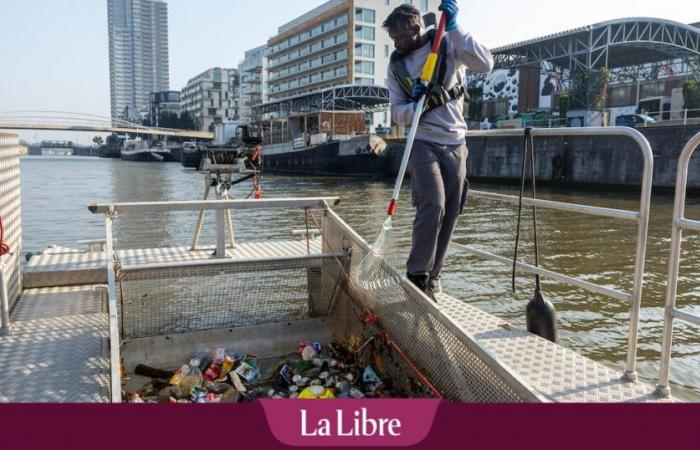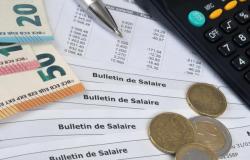Once launched, the Castor is closely followed by the Damona, a second 100% electric cleaning boat, which assists it in its task. On board, Cissé and Quentin, two multi-skilled workers employed by the port of Brussels, follow Eric’s instructions. A red rake on the left, another red rake on the right, a fishing net in the center, the two boats embark on a special kind of aquatic ballet, exchanging instructions by walkie-talkie. “There are three of us, we take the rakes to bring in the waste and when the bin is full, we fill another one and so on. That’s what we do,” Eric comments pragmatically.
Planted rafts on the canal, a “useful plaster” for biodiversity
This morning, the canal seems surprisingly clean, but Eric expects to find more waste near the bridges located there between Laeken and Molenbeek. In Jules de Trooz (Schaerbeek), dams were installed specially to prevent waste from drifting. But again, the facilities are empty. Eric only finds a crushed plastic bottle floating like a dead fish, which he catches with a quick haul of his net. “Seems like there’s nothing today. So much the better. We did our job well.”
A few moments later, however, a cloud of cans looms on the horizon. There are dozens of them, brought to the surface by a dredging boat which has just stirred up the mud from the canal. The Castor and the Damona accelerate and recover everything in a few minutes.
The pilot of the Castor swapped Corsica for the gray waters of Brussels around thirty years ago. His job can be demanding but he does not regret his choice. “I had already worked on boats when I was younger and it really appealed to me. On the other hand, it’s true that in terms of landscape, I didn’t gain anything by coming here compared to Corsica. But I’m happy with what I’m doing.”he confides, while the boat continues its hunt for trash.
The Brussels canal, a way to relieve congestion on city center roads?
The beer can, star of the channel
Little by little, the waste begins to pile up: crushed plastic bottles, a nailed wooden board, a cushion, a sports bag, a block of fridge, a fluorescent green plastic gun, a ripped wallet, two folders plastic, a carton of whole milk and lots and lots of beers. Beer is undoubtedly the star of the channel, it is available in all brands, in cans of all sizes and in bottles. Back at the port, all this waste will be placed in a container.
Bac after bac, outing after outing, the objects collected paint a harsh portrait of Brussels. The sometimes violent discoveries left indelible marks on these three employees. “You really can find everything here. All the life of Brussels is in the canal. Sometimes we come across a dead body. There are also dead animals, weapons and drugs. The first time you find a body, it’s a shock.”confides Quentin.
“We once found a trash bag full of cannabis. Often, dealers come and throw away entire bags for fear of being checked. We also find wallets with papers, suitcases, personal belongings. One day we found a bag containing jewelry. But they were fakes. And corpses happen too. For me that’s the most stressful thing about this job, you never know what you’re going to encounter.” completes Cissé.

How the Brussels Canal went from border to zone of attractiveness
200 cubic meters of trash
Each year, between 200 meters and 250 cubic meters of waste are collected, not counting objects collected separately such as mattresses, bicycles found with a magnet and abandoned on the banks, etc.
“We are the only canal that works with boats. The other ports? They let it happen until the waste disappears, they just wait for it to end up elsewhere,” underlines the spokesperson for the port of Brussels.
To improve the cleanliness of the 80 hectares of water represented by the 14 km of canal in the Brussels-Capital Region, the harbor master’s teams also regularly maintain the banks and quay walls using high-pressure cleaners. Special efforts are also being made for the inland waterway industry, which has a specific waste site at the Molenbeek lock. The port also plans to launch a collection service for oily and greasy waste and small hazardous waste, in addition to its various projects aimed at improving the biodiversity of the canal.








